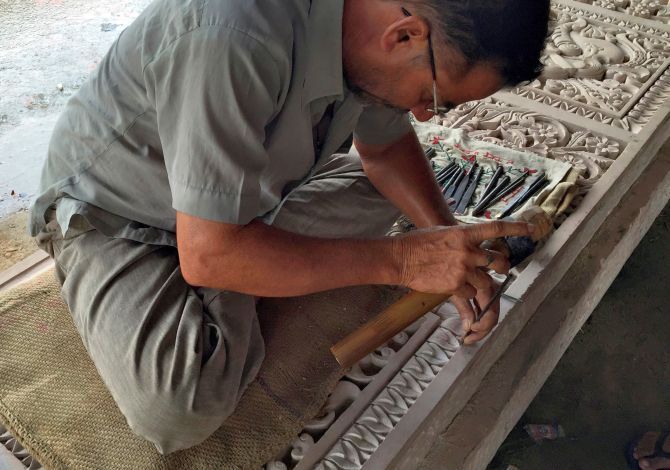'If Rakesh Sinha introduces the bill, but it does not pass the Rajya Sabha in six years, then the bill will lapse.'

Amid a growing chorus from Hindutva outfits for an ordinance on the construction of a Ram temple in Ayodhya, the Bharatiya Janata Party's Rajya Sabha member Rakesh Sinha has said he would bring in a private member's bill in this regard and asked Opposition leaders including Congress President Rahul Gandhi whether they will support it.
For those wondering what a private member bill is and whether it can lead to the Ram temple's construction, Chakshu Roy from PRS Legislative Research has the answers.
Roy, who has studied the history of private member bills in Parliament, informed Syed Firdaus Ashraf/Rediff.com that since 1952 only 14 private member bills have been passed.
So will Rakesh Sinha's bill on the Ram temple be the 15th such bill to be passed? And if yes, what is the procedure?
Could you please elaborate on the study your organisation -- PRSIndia -- undertook on private member bills?
Since 1952, when our Parliament started, only 14 private member bills have been passed by both Houses of Parliament.
Of these 14, 9 were introduced in the Lok Sabha and the rest were introduced in the Rajya Sabha.
Data suggests that a bigger number of private member bills are introduced than the number of such bills discussed in Parliament.
Why does this happen?
The reason: Private member bills are taken up only on a Friday.
In 1952, when the Rajya Sabha started, there was no designated day on which private member bills should be taken up, but the convention was that private member bills would be taken up on a Friday and this convention comes from the British parliament which takes up private member bills on Friday.
In 1964, new comprehensive Rajya Sabha rules were formulated and by those rules, a private member bill would be taken up only on a Friday.
This was formalised in 1964, but the trouble is that there is no time limit for a private member business bill.
So, let us say, if question hour takes long on Friday, then sometimes private member bills cannot be taken up (in the House).
Data suggests that a greater number of private member bills are introduced in Parliament, but comparatively lesser number of bills are actually discussed in Parliament.
What is the importance of a private member bill and why was it introduced in the Constitution?
The role of Parliament is to make laws and law-making is not the exclusive domain of the government.
Members of Parliament are called legislators -- it means they legislate.
The difference is that the government bill has the backing of the government while for a private member bill, the member has to convince his colleagues to get his legislation passed.
The importance of a private member bill is that members of Parliament know that their legislation will not get passed, but the reason they want to introduce private member bills and get them discussed is because it is an opportunity for them to highlight to the government about their concerns.
For example, Naresh Gujral recently introduced a bill on the number of days Parliament sat. He was worried that Parliament was not meeting for enough days.
Similarly, different people have introduced different bills for doing multiple things. In fact, I remember the Right to Information Act, before it was passed, was actually introduced as a private member bill.

Rakesh Sinha, a BJP member of the Rajya Sabha, left, has introduced a private member bill for the Ram temple's construction. Is that according to the rules?
As long as you are a member of Parliament, you can introduce a private member bill whether you are from the ruling party or the Opposition.
When a minister introduces a bill it is called a government bill. It is called as legislative agenda of the government.
The minister has to go to the Cabinet to get it approved and then introduce the bill, while private members can introduce their bills in their personal capacity.
Rakesh Sinha plans to bring his bill during the winter session of Parliament. What is the procedure to do so and how long does it take for a private member bill to be introduced?
For a member of Parliament to introduce a private member bill s/he needs to give 30 days notice. After that, her/his bill can be introduced in the House.
But introduction does not mean it will be straightaway introduced. Introduction means that just like any government bill, you will have to move for a motion of introduction and if the other members of Parliament disagree with the bill, then they can oppose the motion for introduction.
So whenever Parliament convenes next, Rakesh Sinha will have to send his bill 30 days in advance to the Rajya Sabha secretariat which will then go through the bill and make sure that it meets all technical and Constitutional requirements.
The chairman of the Rajya Sabha is the final authority to decide whether the bill can be listed for introduction or not.
In the Lok Sabha, it is a similar procedure, only here the Speaker is the final authority.
It is said MPs do not take private member bills seriously. Is it true?
I think they take it seriously as they are making an effort to introduce it. The question that needs an answer is whether there is enough time to debate private member bills?
If an average session of Parliament is for 30 days, then it will have four Fridays in it. Now, private member bills will be discussed on alternative Fridays.
On one Friday, there will be a private member resolution and other Friday there will be private member bills. So there are only two occasions (two Fridays) left when a private member bill can be discussed.
Another thing that occurs is that on Friday, attendance in Parliament post-lunch is thin. So the real cause for consideration should be what should be done to increase the time for deliberating on private member legislation?
Either Parliament has to sit more or it has to allocate more time (for private member bills).
| Private member bills passed by Parliament | ||||
| 1954 | The Muslim Wakfs Bill, 1952 |
The bill was for providing better governance and administration of Muslim wWakfs and the supervision of Mutawallis management of them in India. The bill was introduced by Syed Mohammed Ahmed Kasmi in the Lok Sabha and passed in 1954. |
||
| 1956 | The Code of Criminal Procedure (Amendment) Bill, 1953 |
Introduced by Raghunath Singh in the Lok Sabha, the bill was passed in 1956. The bill aimed to empower the revisional court to stay or suspend the final orders of lower courts. |
||
| 1956 | The Indian Registration (Amendment) Bill, 1955 |
This bill was moved by S C Samanta in the Lok Sabha and was passed in 1956. The bill aimed at removing the anomaly of recording castes and sub-castes of parties in a deed for registration, as India is a secular state. |
||
| 1956 | The Proceedings of Legislature (Protection of Publication) Bill, 1956 |
Brought by Feroze Gandhi in the Lok Sabha, it was passed in 1956. It aimed to protect journalists reporting on Parliament proceedings and to define by law the privilege available to publications made in good faith of reports of proceedings of legislatures. |
||
| 1956 | The Women’s and Children’s Institutions (Licensing) Bill, 1954 |
Introduced by Rajmata Kamlendu Mati Shah in the Lok Sabha and passed in 1956, the bill was to regulate and license orphanages and other institutions caring for women and children under 18 years of age and to provide for the proper custody, care and training of their inmates. |
||
| 1956 | The Ancient and Historical Monuments and Archeological Sites and Remains (Declaration of National Importance) Bill, 1954 |
The bill introduced in the Rajya Sabha by Raghubir Singh aimed to get certain monuments included in the list of Monuments of national importance declared in the principal Act of 1951. |
||
| 1956 | The Hindu Marriage (Amendment) Bill, 1956 |
Introduced in the Rajya Sabha by Seeta Parmanand and passed in 1956, this bill says that when both the parties belong to the Hindu religion and are marrying under the Special Marriage Act, they will be governed by the Hindu Succession Act, 1956. |
||
| 1960 | The Code of Criminal Procedure (Amendment) Bill, 1957: |
It was introduced by Subhadra Joshi in the Lok Sabha and passed in 1960. To remove the hardship caused to a woman in spending money on litigation when her husband commits the offence of bigamy. |
||
| 1960 | The Orphanages and Other Charitable Homes (Supervision and Control) Bill, 1960 |
Introduced in the Rajya Sabha by Kailash Bihari Lall and passed in 1960, the bill was to provide for the supervision and control of orphanages and other charitable institutions for their better management. |
||
| 1963 | The Marine Insurance Bill, 1959 |
Introduced by M P Bhargava in the Rajya Sabha and passed in 1963, this bill modified the law relating to marine insurance. |
||
| 1964 | The Hindu Marriage (Amendment) Bill, 1962 |
Introduced in the Lok Sabha by Diwan Chand Sharma, the bill was passed in 1964 to make the right to apply for divorce available to both the parties in case of a decree for judicial separation or restitution of conjugal rights instead of the right being available only to the party who obtained the decree. |
||
| 1964 | The Salaries and Allowances of Members of Parliament (Amendment) Bill, 1964 |
Introduced by Raghunath Singh in the Lok Sabha, it was passed in 1964. It was aimed to raise the salaries and allowances of members of Parliament in order to meet the high cost of living. Also to provide air travel facilities. |
||
| 1969 | The Indian Penal Code (Amendment) Bill, 1967 |
Introduced by Diwan Chaman Lall in the Rajya Sabha and passed in 1969, it was to enable works of art to be exempted from the penal clauses in the principal Act relating to punishment for obscenity. |
||
| 1970 | The Supreme Court (Enlargement of Criminal Appellate Jurisdiction) Bill, 1968 |
Introduced in the Lok Sabha by Anand Narian Mullah and passed in 1970, it aimed to enlarge the appellate jurisdiction of the Supreme Court in regard to criminal matters. |
||
Assuming this private Ram temple bill is passed in the Rajya Sabha, when will it go to the Lok Sabha and what is the procedure there?
A bill has to be passed by both Houses of Parliament -- unless it is a Money Bill.
Every bill that is passed by Rajya Sabha has to go to the Lok Sabha.
Is there a time period for that?
If a bill is passed in the Rajya Sabha then it goes to the Lok Sabha and if the term of the Lok Sabha currently exists, then well and good, and if the Lok Sabha does not exist (in case of dissolution), then it will go to the next Lok Sabha session.
The same way the women's bill was first passed in the Rajya Sabha.
The women's bill was not a private member bill, but a government bill ( introduced by the United Progressive Alliance government).
The women's bill went to the Lok Sabha, but before it could be passed the House was dissolved so that bill also lapsed.
If there is a bill pending in Lok Sabha and if the term of the Lok Sabha ends, then that bill lapses. So now if the women's bill has to be passed, then the process will have to start all over again.
Whatever bill is pending in the Lok Sabha, if it is not passed before its term ends, it will lapse.
And if the bill is pending in the Rajya Sabha it continues to remain pending till the time the member who introduced the bill is a member of the House.
So if you are a member of the Rajya Sabha and introduce a bill, but it does not pass the Rajya Sabha in six years, then the bill will lapse.











 © 2025
© 2025